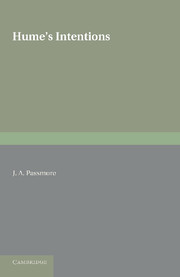Book contents
CHAPTER III - The Methodologist
Published online by Cambridge University Press: 05 June 2016
Summary
Descartes set out to ‘build anew from the foundation’ in order to establish ‘a firm and permanent structure in the science’ Bacon intended ‘to try the whole thing anew upon a better plan, and to commence a total reconstruction of sciences, arts, and all human knowledge, raised upon the proper foundations’. In Hume, these seventeenth-century formulae persist; he tells us that he proposes to erect ‘a compleat system of the sciences, built on a foundation almost entirely new, and the only one upon which they can stand with any security’ (T, xx). And he takes over the assumption, common to Bacon and to Descartes, that ‘a new foundation’ will consist in a new scientific method. Hume's scheme for reconstruction, however, is very different from that of his predecessors.
The ‘security’ which Bacon and Descartes sought was an absolute one; the Cartesian method consists of ‘certain and simple rules, such that, if a man observe them accurately, he shall never assume what is false as true’. With their help, Descartes thought, science could be so constructed that it would consist ‘in its entirety’ of ‘true and evident cognition’. Such aspirations Hume rejected as chimerical; only pure mathematics, on his view, can achieve absolute certainty; no method can wholly protect the empirical scientist against error. If the scientist were content to contemplate his own perceptions, then, indeed, he could rest secure, but then, too, he would have no need of method. The scientist needs method in order to pass beyond immediately-given perceptions; and as soon as he takes that step security has slipped from his grasp.
When Hume proclaims that his method is ‘the only one upon which they [the sciences] can stand with any security’, he is deliberately arousing expectations, in order the more effectively to show that they cannot be fulfilled. The most his method can offer us is security against ‘fictions’—or, more accurately, against the vicious fictions of metaphysics and superstition, as distinct from those harmless, and even laudable, fictions which are essential to the conduct of life. And the method which thus protects us is not axiomatic in structure but experimental; it rests upon experience, not upon self-evident propositions.
- Type
- Chapter
- Information
- Hume's Intentions , pp. 42 - 64Publisher: Cambridge University PressPrint publication year: 2013



